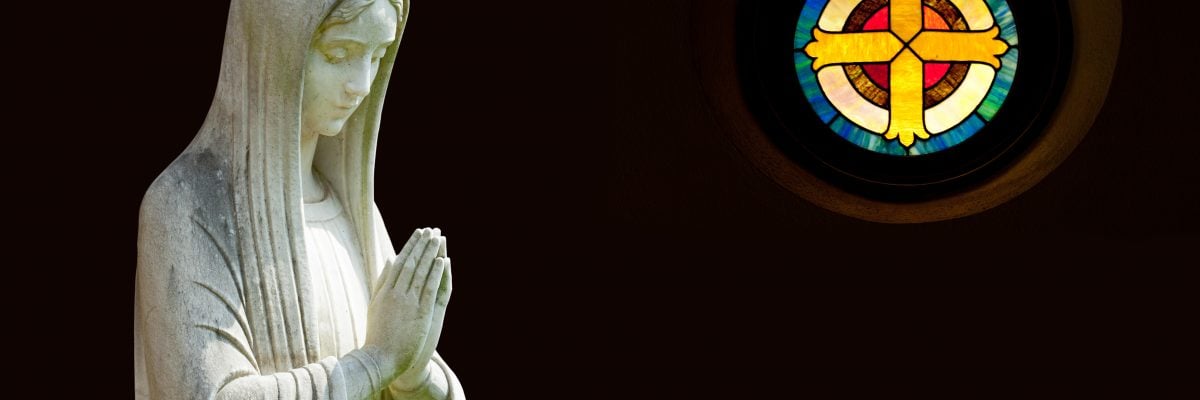
You might find a Fundamentalist who isn’t particularly irked that Catholics have statues in churches and maybe even in their living rooms and gardens. He might realize that he does something similar: he has photographs of his family on the mantelpiece. He might be generous enough to admit that he uses those photographs to remind himself of loved ones, so he can imagine—just barely—that Catholics use statues, paintings, and icons to remind themselves of long-dead Christians. Fine.
The real problem, he says, isn’t that Catholics have statues, and he knows that they don’t actually pray to the statues as such. The real problem is that Catholics pray to saints. (He wouldn’t think of praying to his dead Aunt Mildred.) “That means you do worship the saints,” he says. “At the least, your prayers to saints violate 1 Timothy 2:5, which says, ‘There is one mediator between God and man, the man Christ Jesus.’”
First things first
Several things need to be said about such remarks—after giving him credit and appreciation for what he admits regarding statues and photographs.
First, prayers to saints, asking them to intercede with God for us, don’t violate 1 Timothy 2:5. If they did, then every Christian would stand guilty of violating that verse. Why? Because every Christian prays for other people.
After all, what is a mediator? Merely a go-between. When we pray for others, we act as go-betweens, passing their concerns to God. Fundamentalists regularly ask one another for prayers. They are right to do this, because our Lord commanded that we pray for one another. No Fundamentalist will say to another, “No, I won’t pray for you. Pray to God straight!” Instead, he’ll say, “I’ll gladly pray for you, and please pray for me.” In so praying he becomes a mediator.
This doesn’t violate 1 Timothy 2:5, which really is telling us that our prayers for one another are effectual precisely because Christ is the one mediator. Without his mediation, our prayers would accomplish nothing.
Don’t forget the other verses
Fundamentalists often seem to begin the second chapter of 1 Timothy with the fifth verse. At least that’s how it is in most disputations. It’s as though the preceding four verses had faded from the pages of the ancient manuscripts. Here are those verses in the King James Version:
I exhort therefore, that, first of all, supplications, prayers, intercessions, and giving of thanks, be made for all men, for kings, and for all that are in authority, that we may lead a quiet and peaceable life in all godliness and honesty. For this is good and acceptable in the sight of God our Savior, who will have all men to be saved, and to come unto the knowledge of the truth.
Notice that St. Paul asks for prayers not just for those in positions of authority, such as kings, but “for all men.” He expects his readers to pray for others. He doesn’t list anyone who shouldn’t be prayed for. If we’re to “lead a quiet and peaceable life in all godliness and honesty,” we certainly need to pray for civil leaders but surely also for everyone else, since the “quiet and peaceable life” we seek is lived locally, among everyday people.
So, the apostle asks that we pray for one another, and it’s proper to ask others to pray—for our intentions, for their own intentions, for the needs of all. If it’s proper to ask imperfect Christians on Earth to pray for us, why should it be improper to ask perfected Christians in heaven to pray for us?
Death doesn’t separate us from Christ or the Church. In fact, death brings us closer to both. Keep in mind the simile of the vine and the branches. Christ is the vine, and we are the branches. This is a singular vine: when a branch dies, it doesn’t break off and fall away; it blossoms. It is perfected. Through Christ we remain in communion with other Christians on Earth—and with Christians in heaven (and in purgatory).
On Earth we can ask for our friends’ prayers by calling them on the phone, sending e-mail, using sign language. The only way we can communicate with the saints is through prayer. How can they hear us? We don’t know the mechanics of it, but then we don’t know the mechanics of how God hears prayers, either. To say he hears prayers because he’s omnipotent is no answer. That still doesn’t tell us how he does it. To claim that saints can’t hear us opens us to the claim that God can’t hear us either, and no Fundamentalist believes that.
What’s missing is telling
What seems to be the real problem for Fundamentalists? Why do they get so annoyed with Catholics praying to saints? Ultimately, I think, it’s because they don’t have the Mass. The Mass is the highest form of worship possible—sacrifice. The Protestant Reformers did away with the Mass, so all that Fundamentalists (distant heirs of the Reformers) have to fall back on, as the highest form of worship available to them, is straight prayer. Prayer to saints easily can be confused with prayer to God, if prayer to God is the best one can do. The result: the worship of God may seem indistinguishable from the “worship” (in the old sense) of saints.
Catholics don’t have this problem. Yes, we pray to God, but we also have the Mass, which is radically unlike mere prayer and which honors God alone. It’s easier for Catholics to keep their “honoring” compartmentalized. Despite hoary stories to the contrary, there have been almost no Catholics who have confused honoring saints with adoring God. That may be why, when Catholics see Fundamentalists kneeling with the Bible in their hands, they never think the Fundamentalists are worshipping a book. The thought just never occurs to them.



